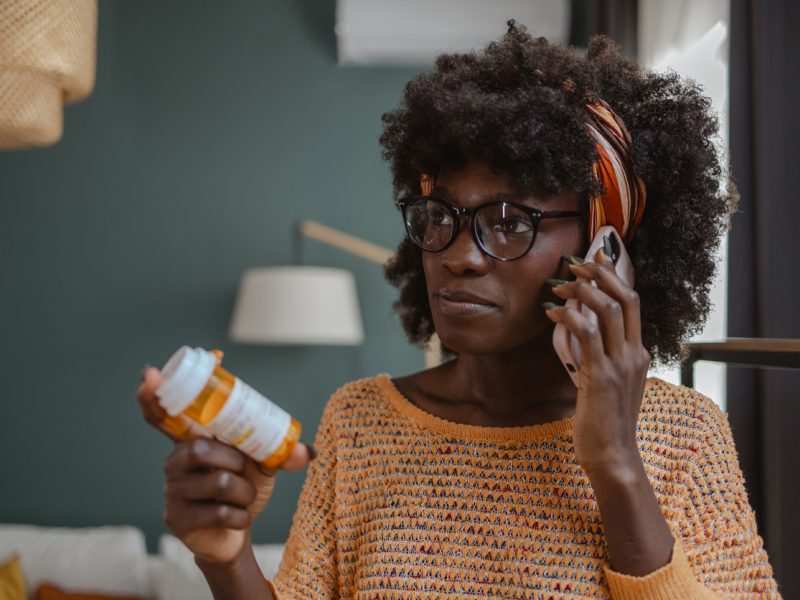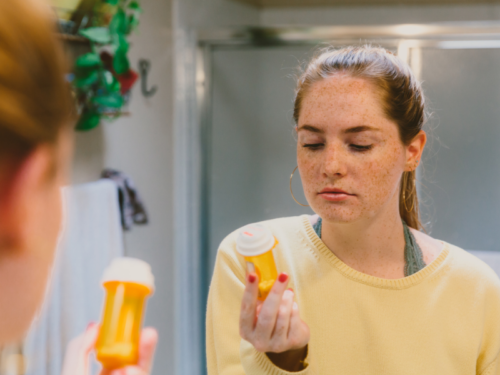
Table of Contents
Read This Before Taking Zoloft for Anxiety

Written By: Dr. Eli Muhrer, M.D.
August 19, 2024
6 min.
Should you take Zoloft for anxiety? Read on to learn what experts think you should know about using this antidepressant as an anxiety disorder treatment.
Learn more about our Clinical Review Process
Table of Contents
Anxiety disorders are very common, affecting more than 40 million U.S. adults and 5.8 million kids and teens, data shows. While dealing with an anxiety disorder –– such as generalized anxiety disorder, panic disorder, or social anxiety disorder –– can feel very lonely, you’re far from alone if you’re struggling right now.
Psychiatric medication such as Zoloft (the brand name for sertraline) is a tried and true treatment for anxiety disorders. With the right medication and dosage, medications can make a huge difference in your anxiety symptoms, functioning, and quality of life. Read on to learn about Zoloft, how it works, its benefits and risks, and more.

Begin virtual therapy and medication management for anxiety today
Fill out our quick form below to learn if Charlie Health is right for you.
Is Zoloft a good choice for my anxiety?
Zoloft (sertraline) is one of the most commonly prescribed medications for anxiety. It is an antidepressant medication in the class of selective serotonin reuptake inhibitors (SSRIs). “As far as psychiatric medications go, we have a lot of evidence for Zoloft being effective for anxiety in various forms, whether that be generalized anxiety, social anxiety, or panic disorder,” says Claire Streeter, PMHNP, ARNP, a Charlie Health Psychiatric Mental Health Nurse Practitioner.
Additionally, Zoloft tends to cause generally fewer side effects and fewer extreme side effects, Streeter adds. That’s not to say there won’t be side effects, but it’s generally well-tolerated. For these reasons, Zoloft can be a good choice for treating your anxiety. However, everyone is different and responds to medications differently. Ultimately, a mental health professional like a psychiatric nurse practitioner or a psychiatrist will make the call on what’s best for you.
How does Zoloft work for anxiety?
So, how exactly does a selective serotonin reuptake inhibitor like Zoloft improve anxiety? First, it’s important to know about serotonin, a neurotransmitter or chemical messenger in the brain. Experts theorize that low serotonin levels are theorized to play a role in developing mental health conditions like anxiety.
SSRIs aim to counteract this lack of serotonin. These antidepressants inhibit the reuptake of serotonin. This means that SSRIs increase the amount of serotonin available in the brain, improving communication between neurons in the brain. By boosting low serotonin levels, SSRIs like sertraline can relieve anxiety symptoms and symptoms of other mental health conditions, such as depression (which is why they are also a commonly used antidepressant medication).
How quickly does Zoloft work for anxiety?
Zoloft does not work immediately. It’s important to be patient while you wait for the medicine to kick in. “It definitely takes a little time. You want to give each dose six to eight weeks to see how it’s going,” Streeter says. “The idea is to start low and go slow.” The slow approach aims to reduce the risk of uncomfortable side effects and major risks such as serotonin syndrome –– more on that later.
It’s common to start with 25 to 50 mg per day (per the FDA’s guidelines) and slowly increase the dose to work up to 150 mg or 200 mg. Some people may see results in several weeks, while others might require more time to reach a therapeutic dose and see the most optimal results from there.
Benefits and risks of taking Zoloft for anxiety
It’s important to consider both the benefits and risks before you start taking Zoloft. For many people, the benefits outweigh the risks. A mental health professional will aid in making this call.
Benefits of taking Zoloft for anxiety
Risks of taking Zoloft for anxiety
- Reduces mental anxiety symptoms
- Relieves physical symptoms of anxiety
- Treats co-occurring conditions
- Potential physical side effects
- Black box warning
- Risk of serotonin syndrome
The benefits of Zoloft
Of course, the biggest benefit of Zoloft is the reduction of anxiety disorder symptoms, resulting in a greater quality of life and the ability to function optimally in your day-to-day life at work or school, at home, and in relationships. For people who suffer from the physical symptoms of anxiety (such as nausea, upset stomach, headaches, and lightheadedness, to name a few), Zoloft can bring relief from not just the emotional symptoms but also the physical ones, Streeter says.
Additionally, it’s very common for an anxiety disorder to co-occur with another mental health condition. For example, around 60% of people with anxiety also experience depressive symptoms. In these cases, a big benefit of Zoloft is that it can help treat comorbid conditions, namely major depressive disorder and post-traumatic stress disorder (PTSD), says Streeter. These are also FDA-approved indications of Zoloft.
The risks of Zoloft
Any prescription medication comes along with risks. Although Zoloft is generally well-tolerated, there are some common potential Zoloft side effects, including:
- Nausea
- Diarrhea
- Fatigue
- Insomnia
- Excess sweating
- Sexual problems (like trouble orgasming or low libido)
- Tremors
- Loss of appetite
For many people, these side effects will occur when they first start taking the medication or when increasing their Zoloft dosage. Then, after a few weeks, the side effects often subside. However, if your Zoloft side effects are not tolerable or you’re feeling worse in any other way, it’s important to let your provider know.
Additionally, Zoloft does have a “black box warning,” which means there’s a possible increased risk for suicidal ideation or behavior, Streeter says. The risk is higher in teens and young adults 24 and under. However, this isn’t unique to Zoloft. Any other SSRI antidepressant also has this warning. If you are having any new or worsening suicidal thoughts, tell your provider right away. You can also call the 988 Suicide & Crisis Lifeline in the case of an acute mental health emergency.
One other major risk is developing serotonin syndrome. This is when your body has dangerously high serotonin levels. The risk is higher if you take any other medications that impact serotonin. Symptoms of this can range from mild (vomiting, diarrhea, dilated pupils) to moderate (muscle spasms, rigid muscles, shivering, abnormal eye movements) to severe (confusion, fast heart rate, high fever, passing out). If you suspect serotonin syndrome, contact a medical professional immediately to ensure your safety.

Other medications for anxiety
On top of Zoloft, there are many other medications to treat an anxiety disorder. SSRIs, in general, are a common first-line option for anxiety. Other than Zoloft, SSRIs include:
- Celexa (citalopram)
- Lexapro (escitalopram)
- Prozac (fluoxetine)
- Paxil (paroxetine)
- Zoloft (sertraline)
Additionally, serotonin and norepinephrine reuptake inhibitors (SNRIs) may be prescribed to treat anxiety as an alternative to SSRIs. These antidepressants work similarly to SSRIs, except on top of impacting serotonin, they also act on another neurotransmitter called norepinephrine. These are the most common daily, long-term anxiety medications.
There are also short-term, more fast-acting medications that can help in times of panic, high anxiety, or especially triggering situations. Streeter says these include:
- Benzodiazepines (a class of central nervous system depressants)
- Hydroxyzine (an antihistamine FDA-approved for anxiety)
- Propranolol (a beta-blocker used for anxiety, especially performance anxiety and social anxiety)
However, these medications aren’t necessarily recommended for long-term use –– especially benzodiazepines. These drugs (such as Xanax, Valium, and Klonopin) have a high risk for dependence and abuse, and they may even cause worse “rebound anxiety,” Streeter says.
Therapy for anxiety disorders
Medication shouldn’t be your only treatment approach for anxiety. The importance of talk therapy alongside meds can’t be understated. “Meds can give you those foundational supports you need physically in order to make changes and build new pathways in the brain to adjust how you’re thinking and coping with things,” says Streeter. “But to actually make the change, you need to do therapy along with it,”
Types of therapy for anxiety disorders include:
- Cognitive behavioral therapy (CBT)
- Acceptance and commitment therapy (ACT)
- Dialectical behavior therapy (DBT)
- Compassion focused therapy (CFT)
- Exposure therapy
- Eye movement desensitization and reprocessing (EMDR)

How Charlie Health can help
If your family is struggling with an anxiety disorder, Charlie Health is here to help. Charlie Health’s virtual Intensive Outpatient Program (IOP) provides more than once-weekly mental health treatment for young people and families dealing with serious mental health conditions, including anxiety disorders such as generalized anxiety disorder, panic disorder, social anxiety disorder, and more. Our expert clinicians incorporate evidence-based therapies into individual counseling, family therapy, and group sessions. We also offer medication management as needed. With this kind of holistic treatment, managing your anxiety is possible. Fill out the form below or give us a call to start healing today.
References
https://www.mayoclinic.org/diseases-conditions/depression/in-depth/ssris/art-20044825
https://my.clevelandclinic.org/health/diseases/17687-serotonin-syndrome
https://www.nami.org/education/the-comorbidity-of-anxiety-and-depression/
https://www.hopkinsmedicine.org/health/conditions-and-diseases/generalized-anxiety-disorder
https://www.accessdata.fda.gov/drugsatfda_docs/label/2016/019839S74S86S87_20990S35S44S45lbl.pdf
https://my.clevelandclinic.org/health/articles/22572-serotonin
https://www.cdc.gov/childrensmentalhealth/features/anxiety-depression-children.html
https://www.nami.org/About-Mental-Illness/Mental-Health-Conditions/Anxiety-Disorders/




